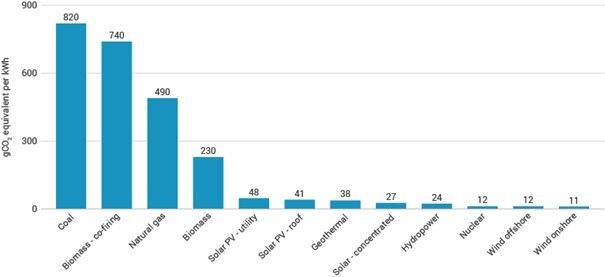
ČEZ Group is a leader in energy transformation in the Central European region. Through its Vision 2030 – Clean Energy for Tomorrow, we strive to ensure that the Czech Republic has sufficient affordable, domestically and ecologically produced electricity in the future.
We produce 62% of all electricity in zero emission sources and are gradually phasing out coal operations, in order to achieve carbon neutrality by 2040. At the same time, we understand that, as a member of the state’s critical infrastructure, the priority is to ensure safety, security, and reliability in the supply of energy to Czech households and companies. That is why we will replace coal-burning power plants with nuclear and renewable sources.
The new nuclear source at Dukovany will help the Czech Republic with decarbonisation, while enhancing its self-sufficiency in power generation.
Clean air, clean environment
Nuclear power plants are an important low-emission source of energy. When assessing the entire life cycle of the power plant (construction, operation, decommissioning, and including fuel production), emissions of CO2 and other greenhouse gases generated by nuclear sources are comparable to those from renewable sources, or even lower. The same is true of emissions of sulphur oxides (SOx) and nitrogen oxides (NOx). Only pure water steam comes out of the cooling towers of Czech nuclear power plants.

Average emissions of carbon dioxide equivalent during the life cycle of various power sources (Source: IPCC)
Nuclear power plants are very considerate to their surrounding environments as well as in terms of other aspects: they do not release any pollutants into the air or into water or soil, their operation is not too noisy, all radioactive waste is stored in special durable containers and in a safe place that is subject to international supervision. Areas around the power plants are subject to constant checks, monitoring, and assessment by various independent organisations and experts. Data collected over the decades of the operation of both Czech nuclear power plants show that their operation has no adverse impact on the environment. On the contrary, plant and animal species are often found in their immediate vicinity (and often directly on their grounds) that only thrive in the cleanest of environments.
The health of the population living in the vicinity of both our nuclear power plants is also subject to assessment. To date, the results of these studies do not show any direct impact of the operation of a nuclear power plant on the health of the people living in their vicinity, and the incidence of diseases does not differ from that in other areas.
Small area, large production
An advantage of nuclear power is its high concentration: a small volume of fuel can generate a huge amount of energy. In 2021, nuclear power plants accounted for 20% of the installed capacity of all power plants in the Czech Republic, but they generated 36% of all electricity.
This makes nuclear power plants the most efficient in terms of the power produced per the area they take up. Whereas one nuclear power plant with a capacity of 1000 MW takes up a couple of hectares, the same installed capacity of photovoltaic or wind power plants would require tens of square kilometres.
The same applies when we consider the entire life cycle of the power plants, including the extraction of materials for the production of their components or fuel. According to a World Economic Forum (WEF) study, nuclear power plants take up the least land of all sources to produce one unit of electricity (e.g., 1 MWh): three times less than a gas power plant, 20x less than photovoltaic panels (in the case of rooftop panels, the area is 2.5 times smaller, because the material extracted for the manufacture of the panels is considered), and 27 times less than a coal power plant (there, coalmines logically take up the greatest amount of land).
Energy: How much land do energy sources use? | World Economic Forum (weforum.org)
A domestic source of self-sufficiency
Nuclear fuel accounts for about one-third of the overall operating costs of a nuclear power plant, whereas in coal power plants, the price of coal accounts for more than 75% of the costs, and in the case of gas, it is more than 85%. A rapid increase in the price of fuel therefore does not affect nuclear power plants to the same extent.
Furthermore, unlike coal and gas, nuclear fuel can be stored for several years, allowing power plants to protect themselves against unexpected shortages in supply. Because the Czech Republic has a long tradition in the nuclear sphere, we possess unique know-how, from research to component manufacture to successful operation and education in the field, to nuclear supervision. To a large degree, we are self-sufficient in terms of the operation of nuclear facilities. Nuclear power plants can therefore be considered a domestic source that increases our country’s independence from foreign suppliers.